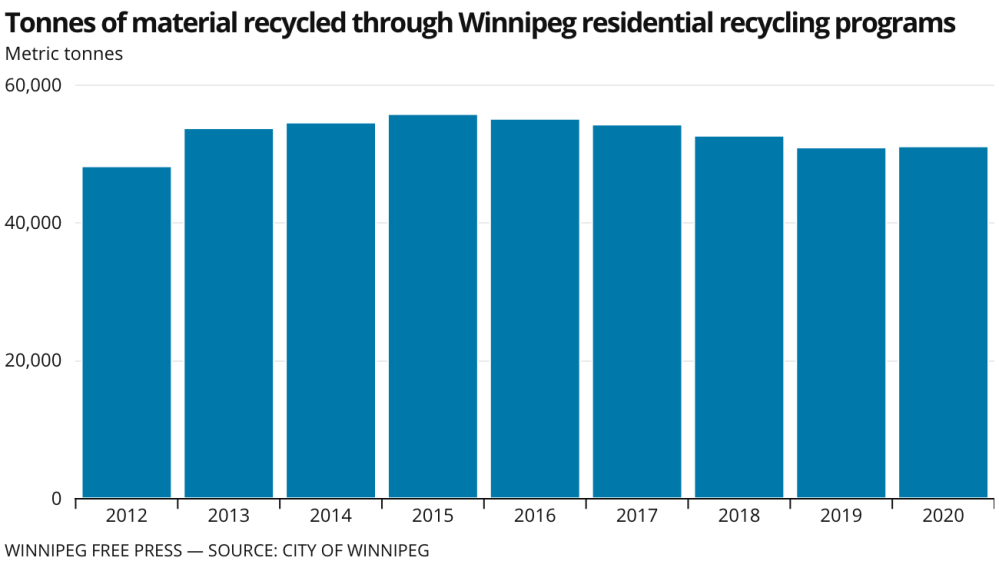Pandemic blamed for trashy 2020 in Winnipeg
Read this article for free:
or
Already have an account? Log in here »
To continue reading, please subscribe:
Monthly Digital Subscription
$1 per week for 24 weeks*
- Enjoy unlimited reading on winnipegfreepress.com
- Read the E-Edition, our digital replica newspaper
- Access News Break, our award-winning app
- Play interactive puzzles
*Billed as $4.00 plus GST every four weeks. After 24 weeks, price increases to the regular rate of $19.00 plus GST every four weeks. Offer available to new and qualified returning subscribers only. Cancel any time.
Monthly Digital Subscription
$4.75/week*
- Enjoy unlimited reading on winnipegfreepress.com
- Read the E-Edition, our digital replica newspaper
- Access News Break, our award-winning app
- Play interactive puzzles
*Billed as $19 plus GST every four weeks. Cancel any time.
To continue reading, please subscribe:
Add Winnipeg Free Press access to your Brandon Sun subscription for only
$1 for the first 4 weeks*
*$1 will be added to your next bill. After your 4 weeks access is complete your rate will increase by $0.00 a X percent off the regular rate.
Read unlimited articles for free today:
or
Already have an account? Log in here »
Hey there, time traveller!
This article was published 09/02/2021 (1694 days ago), so information in it may no longer be current.
It’s official: 2020 really was a garbage year.
Winnipeggers threw out more trash last year compared with 2019 — just another thing to blame on the COVID-19 pandemic.
Michael Gordichuk, the city’s manager of solid waste services, said residential garbage rose 12 per cent last year, jumping to 194,570 tonnes in 2020 from 174,050 tonnes in 2019.
Gordichuk links the increase to residents being forced to stay home during the pandemic.
“We saw a big spike (in garbage), especially in the beginning of the pandemic when people were doing a lot of cleanup… around the house,” he said.
“You never like to see a spike in garbage but with what we’re going through right now, it’s not a surprise,” he added.
On the recycling side, a surge in home deliveries helped trigger an 18 per cent increase in the amount of cardboard the city processed last year (8,992 tonnes compared to 7,598 tonnes in 2019).
“When you look at the shift to online ordering, your parcels… usually come in a cardboard box. Plus, you take cardboard, too, in the amount of increasing takeout (food) orders,” said Gordichuk.
He said the landfill has the capacity to cope with the changes, adding he’s encouraged to see that most cardboard was properly recycled, instead of mixed with other waste.
Between 2019 and 2020, the total amount of recycling rose less than one per cent in Winnipeg (from 50,856 tonnes to 51,011 tonnes).
Gordichuk said the city expects the change in waste habits will continue as the pandemic drags on.
Coun. Brian Mayes, chairperson of council’s water and waste committee, said the changes make sense, since many Winnipeggers have partly or solely worked from home since March. But he added the landfill increase warrants a post-pandemic focus on waste reduction.
“It’s striking. (This) has a system-wide effect on how much cardboard we’re seeing… That can’t be good for the environment,” said Mayes (St. Vital).
A member of Compost Winnipeg, which offers home compost pickups for a monthly fee, said there is clearly room for improvement in local garbage habits.
“I think the part that’s most concerning is people don’t understand how landfills work… I think if we had a closer connection with what we are just throwing out, (not just seeing it as) it’s out of sight, out of mind, we would have a very different outlook on it,” said Karrie Blackburn, the organization’s sales and customer service lead.
Blackburn suggests Winnipeggers compost organic matter, plan meals ahead to reduce food waste, buy in bulk to cut down on packaging, and replace single-use products with reusable ones to help divert material from the landfill.
“I think the part that’s most concerning is people don’t understand how landfills work… I think if we had a closer connection with what we are just throwing out, (not just seeing it as) it’s out of sight, out of mind, we would have a very different outlook on it.” — Karrie Blackburn, sales and customer service lead for Compost Winnipeg
On the flipside, Blackburn said she’s been encouraged to see a recent surge in demand for Compost Winnipeg’s monthly compost collection service, which has grown to 650 residential clients, up from 447 at the end of 2019.
She said that shows more Winnipeggers are working to reduce their waste.
Meanwhile, council’s water and waste committee has delayed a vote on how to better make use of landfill gases. A public service report calls for the city to study two options: convert landfill gases to pipeline quality natural gas for sale; or become a raw landfill gas supplier. The report didn’t recommend previously discussed proposals to convert landfill gases to electric energy and sell it to Manitoba Hydro, or a final option to supply gas to the University of Manitoba through a pipeline.
On Tuesday, the committee opted to postpone its vote for one month, to allow for more consultation on all four options.
joyanne.pursaga@freepress.mb.ca
Twitter: @joyanne_pursaga

Joyanne is city hall reporter for the Winnipeg Free Press. A reporter since 2004, she began covering politics exclusively in 2012, writing on city hall and the Manitoba Legislature for the Winnipeg Sun before joining the Free Press in early 2020. Read more about Joyanne.
Every piece of reporting Joyanne produces is reviewed by an editing team before it is posted online or published in print — part of the Free Press‘s tradition, since 1872, of producing reliable independent journalism. Read more about Free Press’s history and mandate, and learn how our newsroom operates.
Our newsroom depends on a growing audience of readers to power our journalism. If you are not a paid reader, please consider becoming a subscriber.
Our newsroom depends on its audience of readers to power our journalism. Thank you for your support.
History
Updated on Tuesday, February 9, 2021 10:54 PM CST: Makes minor numbers fix.








